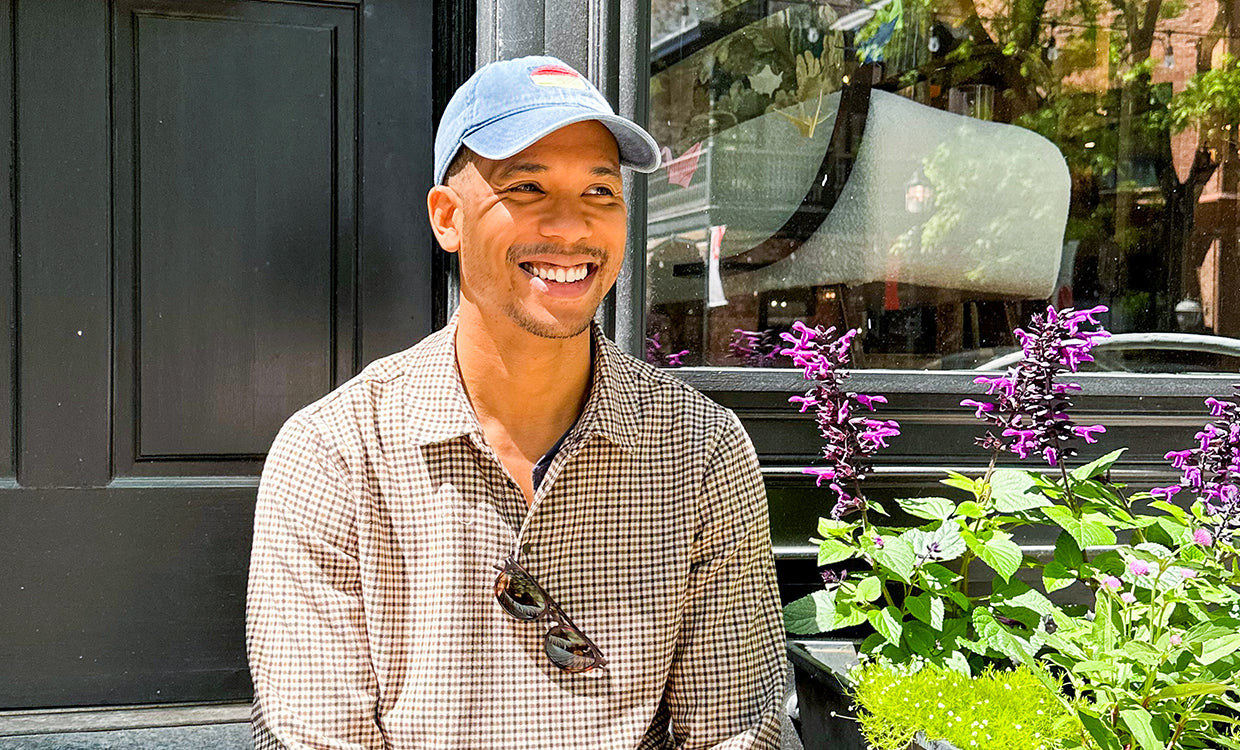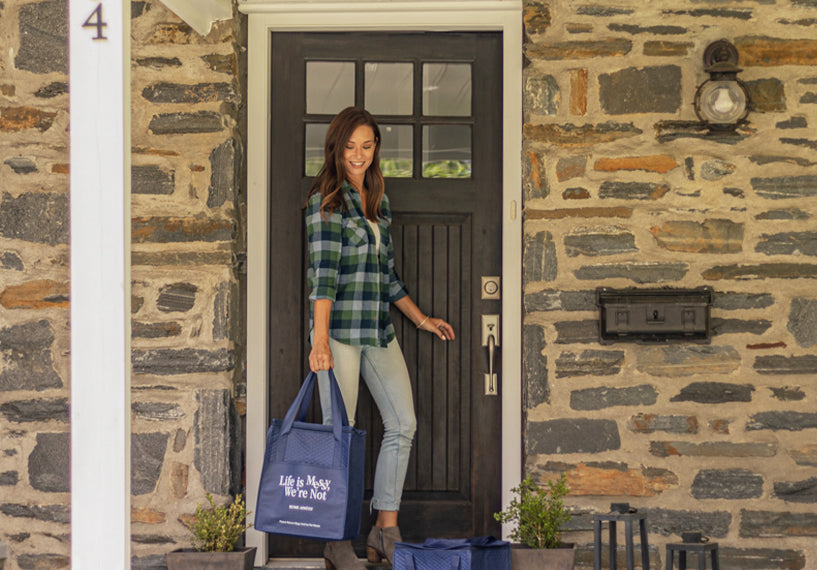H.A. Hang: Jeff Aziakou

The coolest part of our business has always been our clients. We’re amazed by all they do: CEOs and business owners, world travelers, authors, inventors, healers, entrepreneurs, newscasters, artists, pro athletes, musicians, caretakers, and philanthropists.
We launched this series to share the stories of our clients and form connections within the H.A. community. Enjoy!
______________________________________
J.A.: My mom is Chinese and my dad is from Benin in West Africa. They were journalists who traveled all over. I spent half my childhood in France, so I was exposed to a melting pot of cultures. We had a strong Asian community when I lived in Washington DC, but then my Chinese mother would also make a traditional American Thanksgiving dinner in France.
Did you always envision a career in food?
My job in college was as a waiter at the Statler, Cornell's student run hotel. I tried out a few majors like fashion, Chinese, and engineering, but was drawn to the business program in the College of Agriculture and Life Sciences. A significant portion of the curriculum was about our food system: farming, grocery retail, and the supply chain that connects it all.
What was after undergrad?
My first job out of college was running supermarkets for Aldi. It’s a business predicated on efficiency. The stores are small and standardized, with a limited assortment and lean operating principles. It was an amazing opportunity. They recruit college graduates for management programs and throw them into the fire. I started by cleaning toilets, stocking shelves, and working as a cashier. I had to understand every layer of the operation. It was a lens into our food system.
Why did you move on?
I drove more than 100,000 miles that year. That was my first taste of entrepreneurship, in the sense that there's no micromanagement and you're expected to deliver results. But I was also living in hotels and an apartment in New Haven and my friends were all in New York. I was lonely!
I moved to Manhattan and joined an agricultural commodities trading house called Olam. It has a huge role in growing, sourcing, and moving agricultural products around the world. They trade dairy, coffee, spices and vegetables, and more. A seat opened on the cocoa desk and I joined. I had amazing mentors there and I got to work on supplying cocoa to the US market. We bought cocoa from places like West Africa, Indonesia, and South America and sold it to companies like Hershey, Nestle, and Mars.
After working for large companies, what made you decide to start your own business?When I was in college, I worked for an organization called Student Agencies, which is a holding company of student-run businesses. I ran their publishing arm, producing the yearbook. Having the opportunity, as a 19-year-old, to oversee a business—it made me want to become an entrepreneur. After working in corporate jobs, I realized that I wanted new challenges and to attempt to create something out of nothing. I’m lucky to have an amazing wife and family, who support my vision and give me the confidence to pursue this adventure.
How many languages do you speak?
Fluently? Two. English and French. I can also speak Spanish and Portuguese conversationally. I studied Chinese in college and had an internship in Shanghai but eventually gave up the language. But my daughter is studying Chinese now, so it’s fun to recall the words as she learns them.
I started working remotely in 2018, after grad school, and that gave me some time to think about my passion for the food industry. I educated myself, read a lot, met entrepreneurs, and experimented. My wife can tell you horror stories about the many “concepts” I tested, like the beverages I left to ferment in our fridge.
You were always focused on consumer-packaged goods?
I've always had a consumer lens. I'm not smart enough to divine what consumers want, but I I've always had an appreciation for brands and how they listen to consumers. I’m equally nerdy about business models. CPG is something that's tangible and that, ideally, people can develop a relationship with and an affinity for. Food is a conduit for human interaction and joy.
How did you land on desserts?
A friend of mine is a food entrepreneur who helped me brainstorm ideas. And through that process, I started researching desserts. That happened to coincide with the early days of COVID, when I was living with my in-laws and eating every meal at home. We quickly realized that we were defaulting to cookies and ice cream for desserts, due to a lack of alternative options. This reminded me of my childhood in France, where a variety of desserts in small serving sizes are readily available at local stores. I latched on to the idea. A year later I still couldn’t shake it, so I started baking.

Dimi is basically cake in a jar?
We’re trying to introduce a new format to American consumers, and make desserts fun, accessible, and convenient. We want to sell across a variety of grocery stores and foodservice locations, like cafes, and convenience stores. We want to provide consumers with a ready-to-eat dessert offering that expands their options.
Who's your competition?
We’re not the first to market. There are a few brands that make cake in a jar, but not many, which means the opportunity is quite big. Most of our competitors are from overseas, and very much embrace their European identity. In contrast, we want to become a reflection of the American palate. We want to celebrate the diversity of recipes across regions, seasons, and cultures. Maybe your grandma or your aunt makes pecan pie or tres leches once a year—we want to tap into that nostalgia and help customers experience those flavors more frequently.
When did you officially launch?
I spent a year self-producing in a commercial kitchen and testing out our concept. Our first account was Herman's in South Philly. We picked up some distribution, but were really focused on getting feedback and tweaking the first version of our products. We got help from the Drexel Food Lab and Cohere, a local creative agency, to improve our formulas, introduce new flavors, and upgrade our packaging so that we would have the ability to think big. We also scaled production significantly. We officially launched in September of 2022.
Where can people find Dimi?
We sell in local retailers like Riverwards, IGA, Kimberton Whole Foods, and coops around Philly. We also recently joined GoPuff. We're hopefully going to be able to announce a partnership with a big supermarket banner soon. We're also growing our footprint in foodservice, primarily with college campuses. We've found amazing partners at UPenn, Drexel, Temple, Saint Joe's, UDel, UArts, and more. We also invested a lot into grassroots activation—we did 150+ events in Q4 of 2022 and we just wrapped a pop-up at the King of Prussia Mall. We are trying everything and seeing what sticks.
What’s the biggest lesson you’ve learned?
Everything takes longer and costs more money than you originally plan for. So patience is key!
And the last, but maybe most important question: What’s your daughter’s favorite Home Appétit dish?
Moni devours the mac and cheese. It is so good!


